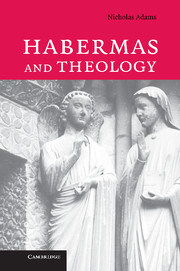Book contents
- Frontmatter
- Contents
- Preface
- 1 Religion in public
- 2 The ideal speech situation
- 3 Authority and distance in tradition
- 4 Sacred and profane
- 5 Universalism
- 6 Theology and political theory
- 7 Theology, social theory and rationalisation
- 8 Modernity's triumph over theology
- 9 Habermas in dialogue with theologians
- 10 Narrative and argument
- 11 Scriptural difference and scriptural reasoning
- List of references
- Index
8 - Modernity's triumph over theology
Published online by Cambridge University Press: 23 December 2009
- Frontmatter
- Contents
- Preface
- 1 Religion in public
- 2 The ideal speech situation
- 3 Authority and distance in tradition
- 4 Sacred and profane
- 5 Universalism
- 6 Theology and political theory
- 7 Theology, social theory and rationalisation
- 8 Modernity's triumph over theology
- 9 Habermas in dialogue with theologians
- 10 Narrative and argument
- 11 Scriptural difference and scriptural reasoning
- List of references
- Index
Summary
In his later work, Habermas is more explicit about why he thinks that even contemporary theology cannot perform a useful role in questions of modern ethical theory. In his refinements of the discourse ethics project, religion still plays a major part in his arguments, and it is important to clarify what this part is. Because of the connection he makes between theology and metaphysics, and because ethical theories in modernity must be post-metaphysical, Habermas claims that theology is no good for contemporary ethics. This is not to say that he knows no examples of post-metaphysical theology, and in chapter 9 we shall look at how he debates with some post-metaphysical theology. Rather, Habermas refuses to acknowledge that post-metaphysical theologies are genuinely theological, in the sense of being tradition-bound interpretations of scripture and ritual. Habermas also believes that philosophical interpretations of God's being and action are not just successful interpretations but are too successful: they make it unnecessary any longer to speak about God. If a post-metaphysical theology were to be viable, for Habermas, it would have to avoid interpreting God away using other concepts, and yet avoid being unintelligible to modern forms of self-consciousness. He thinks that it cannot be done, and the reasonings behind this are rehearsed in some of his later work. This work is the focus of the current chapter. In my view, Habermas indulges in some questionable readings of the philosophical tradition, and some sharp criticisms are called for.
- Type
- Chapter
- Information
- Habermas and Theology , pp. 154 - 181Publisher: Cambridge University PressPrint publication year: 2006

